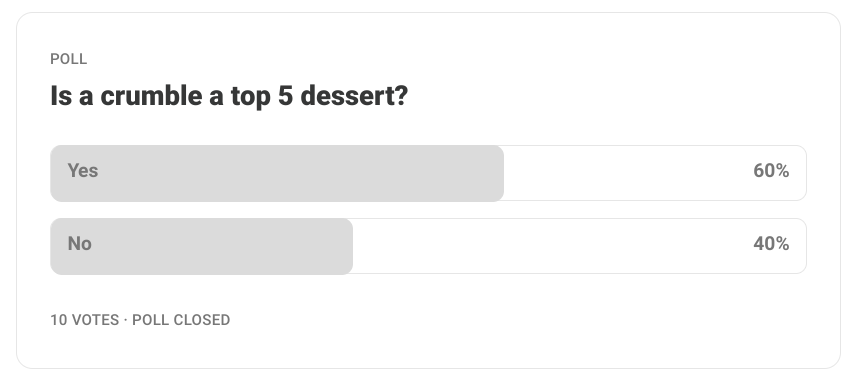How to solve a problem like international students
At universities, and in recruitment processes, are there problems?
Hello!
Thank you for joining me, I’m so glad you’re here.
Thanks for bearing with me and my break last week. I spend half my Sunday writing this, but I probably spend a few hours in the week reading articles and newsletters, and coming up with a topic. Due to the busy-ness of the week, I just hadn’t read enough to be able to sit and write things.
Onto important things:
Thank you to the 10 people who voted in the poll in the last newsletter. I’m glad you agree that crumble is top 5.
I sadly have no food-based poll for you this week. My team have not forgotten “olivegate” yet, however.
I’ve been enjoying Education Marketer Kyle’s newsletter discussions around international students recently. On the recruitment side of things, we may be seeing more international student applicants, but I think it’s important to see the bigger picture here.
While tuition fees may feel very expensive at an individual level, the frozen cap has meant that universities can’t make ends meet, and many are on the cusp of bankruptcy [The i]. My local university, and ex-employer sadly let a bunch of people go recently, including the team I used to work in, where we were involved in important projects that positively impacted the lives of disadvantaged students. This has all gone now.
The one thing that is keeping things together (if by a very thin thread) is the number of international students, who pay more in fees than local students. With a graduate visa costing c.£2000 at the end, for a two-year period of right to work in the UK, it’s a good deal for many students.
The downside? It changes the university experience for many local students. Places like Reddit have amassed lots of posts about students giving their experience studying alongside international students, noting things like feeling excluded because they’re speaking their home language in class and in projects [Reddit], and that they don’t put as much effort into classes.
I remember when I was a uni student in Japan, one of the biggest cultural shocks for me was how chill they were in class - reading magazines and so on. In Japan, getting into university is super hard and so the biggest stress point will be that final year of high school. In the UK, it’s much easier to get into university, but it’s much harder to graduate, so the pressure to pass each module is high. It seems from British student accounts that this cultural difference may be playing out here too.
But if it means that universities stay open, and local students can study what they like, and the international students get a crack at working in the UK, everyone’s happy right?
Wrong.
Because international students aren’t getting hired.
Back on Reddit, I try to spend a few hours a week giving advice to people (mostly grads and apprentice applicants) struggling to find work, and one thing I see over and over is posts from international grads who can’t get hired. It’s got to the point where international grads are advising would-be students to think again about coming to the UK.
From a recruitment side, I think there is a general lack of awareness around grad visas. Yes, you get a highly skilled (many international students worked for a few years before coming to study here) graduate without having to sponsor them, but it’s only for two years, and even if you are able to sponsor them afterwards, their salary will need to meet the requirements for a skilled worker visa (c.£37k).
I’ve been in orgs before that has not had the capability to sponsor people, so we had to straight up reject people who needed visas (which is a discrimination grey zone [People Management]). Luckily I am able to offer visas now, but some roles won’t have the salary trajectory that will allow us to sponsor, and a lot of international students will straight up lie in their application and say they don’t need sponsorship, including in the future. I have an eye for it now (oh, you graduated in 2024 with a masters in data science? And before that you were in another country?? You’re not fooling me) but the time spent on responding to these (many) applicants takes time away from other areas, and I don’t want to send them a rejection template with no reason attached.
I’m working on integrating this into our role approval system, so we agree in advance where we can and can’t take on international candidates, and then have a legally approved text in the advert advising people up front. When I was exploring this and getting inspo from other orgs, I was shocked to see hardly any job adverts advising international candidates. It feels like an obvious step for me, in a landscape where there are so many international graduates, so I wonder if there are others out there doing the same.
When I advise international grads on Reddit, I feel myself repeating over and over that they will need to prove that they are worth the future c£15k investment in their sponsorship, so either they need to plug a skills gap local grads aren’t plugging, or make sure they’re showing that they are truly head and shoulders above the rest. At work, we do have skills gaps that local students don’t fill (mostly in mech/elec engineering) and so sponsorship is important for us, but when you have 500 applications for a data role, it can be easy to pick one of the many local graduates over an international grad.
Education Marketer Kyle linked an interesting LinkedIn post in one of his newsletters, an international grad who is very angry at the lack of support she says she received when she was applying for work, and has now made her own business matching students with employers who hire people like her. There are are a few LinkedIn influencers out there pushing great advise around visas in the UK (which understandably do very well, given that it’s a hot topic).
So what’s next?
I think we employers need to get used to the idea of unis going under, and the pipeline of graduates becoming tighter. It’s a great chance to put a bit more pressure on businesses to take up apprenticeships instead, giving young people alternate opportunities when university becomes less of a viable option.
As I said, we do still have lots of skills gaps that are plugged by wonderful international candidates. I hope the new government keeps a pipeline going, for orgs like ours to be able to take up great talent from abroad.
As always, please do let me know your thoughts!
Links
With places like Nandos running level 2 customer service apprenticeships for salaries as low as £11k, candidates are starting to question whether these are learning opportunities or ways to hire cheap labour.
Cardiff Council has proposed a bizarre ban on students being able to get parking permits to park outside their houseshares. I don’t know why you would penalise students like this. As one commenter rightly says, this greatly impacts people such as nursing students, who need to drive to their placements.
Speaking of bizarre decisions, this recruiter appears to reject anyone without dates next to their degrees. I mean come on, you can see how much experience someone has through their work experience, why go to these lengths when people are just trying to tackle ageism.
Vicki Saunders, the employer brand expert, is putting out some seriously top tier content right now. I loved this post from her this week about the rise in internal mobility, and the importance of applying your EVP internally. With gen z moving on to new roles quicker than people have done previously, it makes it even more important to appeal to internal candidates better.
Careers advisor Lucy Sattler has a banging newsletter on LinkedIn, and I loved the spooky jobs theme from last week’s edition. I would imagine we’re going to need many more death doulas moving forward - something to consider!
Speaking of LinkedIn newsletters, careers expert Anthony Adams has just launched his own - find the first one here!
Substack
linked to a smashing article [Fast Company] this week, that talked about why gen z aren’t bringing their all to their jobs. It’s a must-read, but the bottom line is that gen z are used to their surroundings being tailored to them, and the workplace is the first place that doesn’t do this.TikTok
Trend of the week is the “running suspect” meme. A pair of people take it in turns to run alongside the camera, with the camera person serving harsh words, as if to describe the “suspect” running away.
Here’s another example:
 Tiktok failed to load.
Tiktok failed to load.Enable 3rd party cookies or use another browser
And the cutest example you’ll see:
 Tiktok failed to load.
Tiktok failed to load.Enable 3rd party cookies or use another browser
How can you use this trend? Have a manager and an employee (who have a good relationship and lots of psychological safety!!) run alongside each other. “Suspect pretends to be listening in 1:1s but is reading her emails” etc etc. A great example of a healthy feedback culture - and a fun place to work.
I can’t leave you without showing you a TikTok of a job. This week’s epic example are people who make globes BY HAND. Honestly, I need to win the lottery because I need one.

 Tiktok failed to load.
Tiktok failed to load.Enable 3rd party cookies or use another browser
Have a great week ahead!
Until next week,
Charlotte










